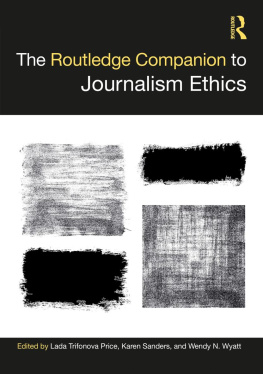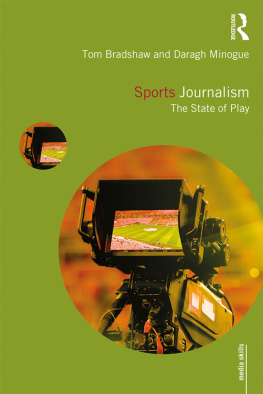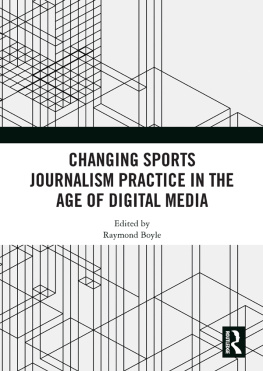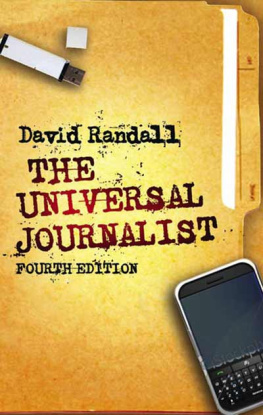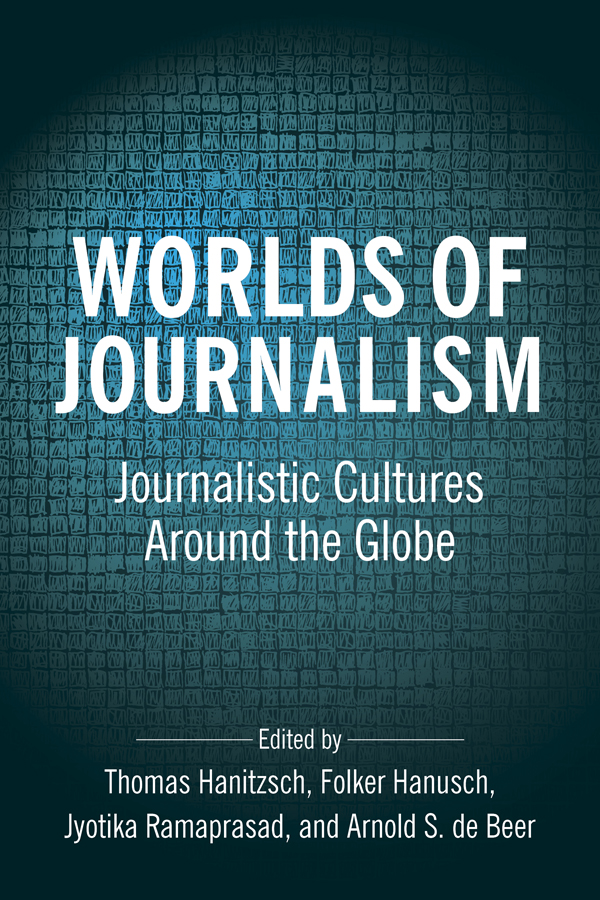Contents
Guide
Pagebreaks of the print version
WORLDS OF JOURNALISM
Reuters Institute Global Journalism Series

Reuters Institute Global Journalism Series
Series Editors: Rasmus Kleis Nielsen and the Reuters Institute for the Study of Journalism
Reuters Institute for the Study of Journalism, Editorial Committee
Prof. Rasmus Kleis Nielsen, Director of Research, RISJ, Oxford (Chair)
Prof. Timothy Garton Ash, Professor of European Studies, St. Antonys College, Oxford
Prof. Ian Hargreaves, Professor of Digital Economy, Cardiff University
Dr. David A. L. Levy, Director, RISJ, Oxford
Geert Linnebank, Trustee of the Thomson Reuters Foundation and nonexecutive director, ITN
John Lloyd, Contributing Editor, the Financial Times , Senior Research Fellow, RISJ, Oxford
Meera Selva, Director of Fellowship Programme, RISJ, Oxford
Alan Rusbridger, Principal, Lady Margaret Hall, Oxford
Prof. Jean Seaton, Professor of Communications and Media History, University of Westminster
Prof. Katrin Voltmer, Professor of Communication and Democracy, University of Leeds
Dr. Lucas Graves, Senior Research Fellow, RISJ, Oxford
Matthew Powers, NGOs as Newsmakers: The Changing Landscape of International News
WORLDS OF JOURNALISM
Journalistic Cultures Around the Globe
Edited by
Thomas Hanitzsch, Folker Hanusch, Jyotika Ramaprasad, and Arnold S. de Beer
Columbia University Press
New York
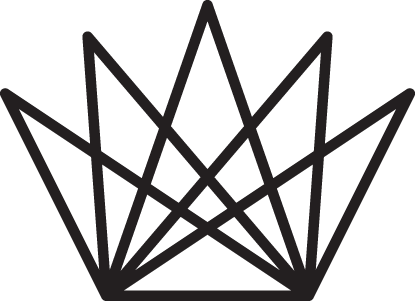
Columbia University Press
Publishers Since 1893
New York Chichester, West Sussex
cup.columbia.edu
Copyright 2019 Columbia University Press
All rights reserved
E-ISBN 978-0-231-54663-8
Library of Congress Cataloging-in-Publication Data
Names: Hanitzsch, Thomas, 1969 editor. | Hanusch, Folker, 1975 editor. | Ramaprasad, Jyotika, 1949 editor. | de Beer, A. S. (Arrie), 1942 editor.
Title: Worlds of journalism : journalistic cultures around the globe / edited by Thomas Hanitzsch, Folker Hanusch, Jyotika Ramaprasad, and Arnold S. de Beer.
Description: New York : Columbia University Press, [2019] | Series: Reuters Institute global journalism series | Includes bibliographical references and index.
Identifiers: LCCN 2018048847 (print) | LCCN 2018061249 (ebook) | ISBN 9780231546638 (electronic) | ISBN 9780231186421 | ISBN 9780231186421 (cloth : alk. paper) | ISBN 9780231186438 (paperback)
Subjects: LCSH: Journalism. | Reporters and reporting. | JournalistsAttitudes.
Classification: LCC PN4781 (ebook) | LCC PN4781 .W74 2019 (print) | DDC 070dc23
LC record available at https://lccn.loc.gov/2018048847
A Columbia University Press E-book.
CUP would be pleased to hear about your reading experience with this e-book at .
Cover design: Lisa Hamm
CONTENTS
Thomas Hanitzsch, Folker Hanusch, Jyotika Ramaprasad, and Arnold S. de Beer
Thomas Hanitzsch, Laura Ahva, Martin Oller Alonso, Jesus Arroyave, Liesbeth Hermans, Jan Fredrik Hovden, Sallie Hughes, Beate Josephi, Jyotika Ramaprasad, Ivor Shapiro, and Tim P. Vos
Corinna Lauerer and Thomas Hanitzsch
Beate Josephi, Folker Hanusch, Martin Oller Alonso, Ivor Shapiro, Kenneth Andresen, Arnold de Beer, Abit Hoxha, Sonia Virgnia Moreira, Kevin Rafter, Terje Skjerdal, Sergio Splendore, and Edson C. Tandoc, Jr.
Thomas Hanitzsch, Jyotika Ramaprasad, Jesus Arroyave, Rosa Berganza, Liesbeth Hermans, Jan Fredrik Hovden, Filip Lb, Corinna Lauerer, Alice Tejkalov, and Tim P. Vos
Basyouni Hamada, Sallie Hughes, Thomas Hanitzsch, James Hollings, Corinna Lauerer, Jesus Arroyave, Verica Rupar, and Sergio Splendore
Thomas Hanitzsch, Tim P. Vos, Olivier Standaert, Folker Hanusch, Jan Fredrik Hovden, Liesbeth Hermans, and Jyotika Ramaprasad
Jyotika Ramaprasad, Thomas Hanitzsch, Epp Lauk, Halliki Harro-Loit, Jan Fredrik Hovden, Jari Vliverronen, and Stephanie Craft
Arjen van Dalen, Rosa Berganza, Thomas Hanitzsch, Adriana Amado, Beatriz Herrero, Beate Josephi, Sonja Seizova, Morten Skovsgaard, and Nina Steindl
Folker Hanusch, Edson C. Tandoc, Jr., Dimitra Dimitrakopoulou, Nurhaya Muchtar, Kevin Rafter, Mireya Mrquez Ramrez, Verica Rupar, and Vittoria Sacco
Folker Hanusch and Thomas Hanitzsch
This book is founded on a project that has come a long way since its inception. The seed for what would later become the Worlds of Journalism Study (WJS) was planted in October 2006, when a group of scholars started a small pilot study with the aim to compare journalistic cultures in seven nations. Ten years later, in early 2017, when data collection was completed for the second wave of surveys with journalists, the project had developed into an intercontinental endeavor of researchers from sixty-seven nations, whose contributions sustained the project through its various stages, and which has now culminated in this book.
This book stands on the shoulders of giants and owes much to our many good friends and supportive colleagues across institutions around the world. David Weaver, whose seminal collection The Global Journalist appeared in 1998, was a major inspiration for us. Weavers Global Journalist , as well as the scholarship of Wolfgang Donsbach, notably his work with Thomas Patterson, set the stage for large-scale, cross-national investigations into journalists professional values and aspirations. With these models in place, it seemed the next step was to begin large collaborative projects in journalism studies, and the WJS and this book are our attempt to do so.
The unique nature of the WJS, an international research endeavor driven by a collective of scholars from all around the world, necessitated a distinctive approach to collaborative publication. Readers will quickly realize that the book does not fit squarely into established classifications of scholarly publications. Reflecting the collaborative work ethos of the project, each chapter was written by a team of up to twelve authors. In addition to contributing as authors to various chapters, the four of us served as editors, overseeing and facilitating this sometimes complicated process of collective knowledge production. Perhaps, if there is any single term that can reasonably describe the nature of this book, it is edited research monographa genre that has gained popularity at a time when collaboration has increasingly become central to research and science. Altogether more than forty scholars have contributed to this book, bringing their rich knowledge and cultural experience to bear on the analysis of a data set that contains interviews with more than 27,500 journalists, as well as on interpretation and explanation of findings.
Now, as the task of writing is done, it is time to extend our deepest gratitude to those who helped make this book possible. We begin with the recognition of the hard work of the research teams in all sixty-seven countries, many of whom also contributed to this book; their dedication stood us in good stead through this undertaking. Our project website provides a full list of the principal investigators in these countries (http://www.worldsofjournalism.org/research/2012-2016-study/principal-investigators/). We next thank our colleagues who have served with us on the current and previous WJS Executive Committeesin alphabetical order, Ashraf Galal Hassan Bayoumy, Basyouni Hamada, Epp Lauk, Claudia Mellado, and Martin Oller Alonso. We also owe our gratitude to the nine eminent researchersLee Becker, Joseph Man Chan, Joaquim Fidalgo, Beate Josephi, Henrik rnebring, Paschal Preston, Zvi Reich, Elena Vartanova, and David Weaverwho advised us as members of our Scientific Advisory Committee.


